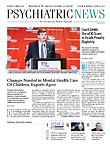The field of psychiatry and neuroscience is haunted by four “inconvenient truths” about the diagnosis and treatment of mental illness, said National Institute of Mental Health (NIMH) Director Thomas Insel, M.D., in a lecture titled “From Psychiatry to Clinical Neuroscience” at APA’s 2014 annual meeting in New York in May.
These are his four inconvenient truths: the field has failed to “bend the curve” in the prevalence and cost of mental illness; more people are getting more treatment, but outcomes are not getting better; the current knowledge base is insufficient to ensure prevention, recovery, or cure for too many people with serious mental illness; and a transformation of diagnostics and therapeutics is necessary to make significant progress in treating mental illness.
Insel contrasted the remarkable progress of the last several decades in reducing morbidity and mortality associated with major medical conditions such as stroke, heart disease, pediatric cancers, and AIDS with the stubbornly high rates for mental illness. He noted, as an example, that the suicide rate in the United States is as high as it has ever been.
“I can’t tell you a success story as I can for pediatric cancer or AIDS when we talk about suicide,” he said. “It’s rather remarkable that over the last two decades the suicide rate hasn’t budged at all. With about 38,000 suicides a year, we are as high in absolute numbers as we have ever been.”
Depression Blamed for High Mortality
Insel added that statistics for morbidity and disability indicate that nearly 20 percent of all medical disability can be attributed to neuropsychiatric disease—more than are associated with cancer, heart disease, or stroke. “These numbers should give us real concern,” he emphasized. And he noted that when looking at the metric for “disability adjusted life years”—DALY, or the years lost to premature mortality and disability—the big driver is depression.
“This is partly because of prevalence and because it is so disabling, but also because it starts early,” Insel said. “Nearly 75 percent of adults with mental illness describe onset before age 25—that’s very different from cancer or heart disease. Up until the fifth or sixth decade, these [neuropsychiatric] disorders are the story.”
Insel outlined some of the problems that have hindered efforts “to bend the curve.” These include that diagnosis is limited to observable symptoms, and detection is almost invariably late; etiology of most mental illness is unknown; and prevention is not well developed for most disorders. And treatment is trial and error, without cures or vaccines.
Moreover, what is known as the mental health “system” is a poorly integrated maze of nonspecific pathways of care, with some people entering through the emergency department, criminal justice system, primary care system, or nonprofessional services. Diagnosis and treatment vary from provider to provider and from patient to patient, he noted.
Brain Remains ‘Unknown Territory’
Knowledge of the brain, despite enormous advances in recent years, is still in its infancy, Insel pointed out. “The brain is a world consisting of a number of unexplored continents and great stretches of unknown territory,” he said.
But he also described a promising future in which mental illness is reenvisioned as a disorder of brain circuitry that will be greatly advanced by President Obama’s BRAIN Initiative, announced in April 2013.
Research is revealing how chemical imbalances can lead to circuit dysfunction, and in turn to behavioral symptoms, and Insel said the connections that are emerging can be used in the development of diagnostic tests for brain disorders that are today diagnosed late through observation of symptoms. “We can now study the mind with the tools of neuroscience,” he said.
For instance, he presented evidence that is revealing attention-deficit/hyperactivity disorder to be a disorder of delayed cortical maturation. He also presented evidence of schizophrenia as a neurodevelopmental disorder with distinct risk and prodromal stages that allow for early intervention.
Finally, he described the NIMH Research Domain Criteria (RDoC) project, which he said will work in tandem with DSM. “DSM/ICD will continue to be the basis of clinical care,” he said. “RDoC is a framework for research in which NIMH will support researchers to deconstruct current diagnostic categories or identify dimensions that extend across categories. RDoC will develop through an information commons that integrates data from many sources, transforming the way we diagnose mental disorders in the future.” ■

